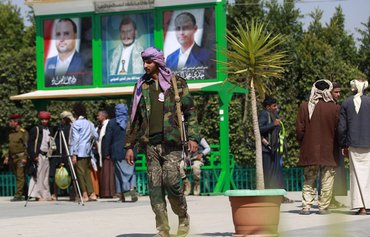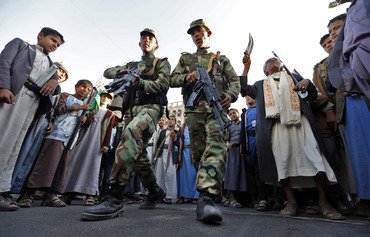In recent months, the Houthis (Ansarallah) have been consolidating their control over areas of Yemen they occupy by purging public agencies of employees affiliated with the General People's Congress (GPC), Yemeni experts say.
After assassinating former Yemeni President Ali Abdullah Saleh, who had announced that his General People's Congress (GPC) was splitting with the Houthis, the Iran-backed militia went on to detain or assassinate GPC members.
In the aftermath of Saleh's December 4th slaying, the Houthis also announced a package of new appointments in public sector agencies that favour Houthi loyalists at the expense of GPC members and former associates of Saleh.
These decisions, issued via the so-called Houthi Political Council, included the appointment of new ministers of interior and telecommunications, replacing ministers loyal to Saleh.
![Newly recruited Houthi fighters chant slogans during a gathering in Sanaa on February 2nd, 2017. [Mohammed Huwais/AFP]](/cnmi_am/images/2018/04/20/12336-Yemen-Sanaa-Houthi-600_384.jpg)
Newly recruited Houthi fighters chant slogans during a gathering in Sanaa on February 2nd, 2017. [Mohammed Huwais/AFP]
The militia also appointed loyalists to head Yemen’s intelligence agencies -- the national security and political security agencies -- and the Central Organisation for Control and Auditing, in addition to judicial agency appointments.
Hussein al-Azzi, who had served as director of the Houthis' political bureau, was appointed deputy foreign minister.
Hashem Mohammed Hashem al-Shami was named as head of the tax authority; Salim al-Hadrami of the customs authority; and Khalid Mohammed Abdullah Sharafeddine as vice chairman of the General Investment Authority.
Hussein Abdullah al-Numeiri was appointed deputy chairman of the Yemen Geological Survey and Mineral Resources Board, and Ahmad Abdullah al-Azani as chairman of the General Authority of Lands Surveying and Urban Planning.
In the education sector, the Houthis appointed Ahmed Mohamed Hadi Daghar as president of Sanaa University and Abdullah Mohammed Mohammed al-Shami as president of Al-Hodeidah University.
Both universities are under the control of the Houthis.
Destruction of state institutions
"The Houthis’ project is predicated on the destruction of the state and its institutions," GPC general committee member Adel al-Shujaa told Al-Mashareq.
After assassinating Saleh, the Houthis became the sole decision makers and most powerful authority in areas under their control, he said.
Secure in this knowledge, they turned their attention to matters of administration, he said, to "eliminate state institutions and render civil service institutions as subsidiaries to [the Houthis], and not to the state".
The appointment of Houthi loyalists is tantamount to conveyance of ownership, said lawyer and human rights activist Abdul Rahman Barman, giving appointees "the total freedom to do whatever they want with [agencies] and their assets".
This policy, and assignment of civil service positions to Houthi elements and loyalists is the group’s modus operandi, Barman told Al-Mashareq, noting that one of the Houthis' objectives is to control civil service agencies.
"After the coup, the [Houthis] went after national cadres, imprisoned many government officials, confiscated their property, terrorised them and threw them out on the street," Barman said.
They were replaced with members of the Houthi militia, he said.
These appointments adversely affect the performance of government institutions and are one of the reasons for their failure, he added, as these institutions no longer provide services to the Yemeni people.
'Making a farce of civil service'
"The Houthis are making a farce of civil service," development expert Mohammed al-Hoshbi told Al-Mashareq.
In 2018, all the applicants who were accepted to positions at the Higher Judicial Institute were Houthi loyalists, he said, noting that pro-Houthi employees in other state entities, such as hospitals, also have received favourable treatment.
"All [state] employee salaries have been cut off for more than a year and a half, and the Houthis hired thousands of their elements as volunteers," he said.
These "volunteers" have been paid salaries "under the pretext of filling the void caused by the inability of a large number of employees to go to work", he said.
"Now they want to dismiss the original employees and officially confirm the status of their elements as permanent employees by court order," he added.
The Houthis are also trying to force thousands of government employees into retirement, he said, even though many have not reached retirement age or put in the required 35 years of government service.

![Supporters of Yemen's Houthis attend a December 5th, 2017 rally in Sanaa to celebrate the death of Yemeni ex-president Ali Abdullah Saleh, a day after he was killed. Since Saleh's death, the Iran-backed militia has been ousting his supporters from state agencies in areas under its control. [Mohammed Huwais/AFP]](/cnmi_am/images/2018/04/20/12346-Houthis-Sanaa-rally-600_384.jpg)






